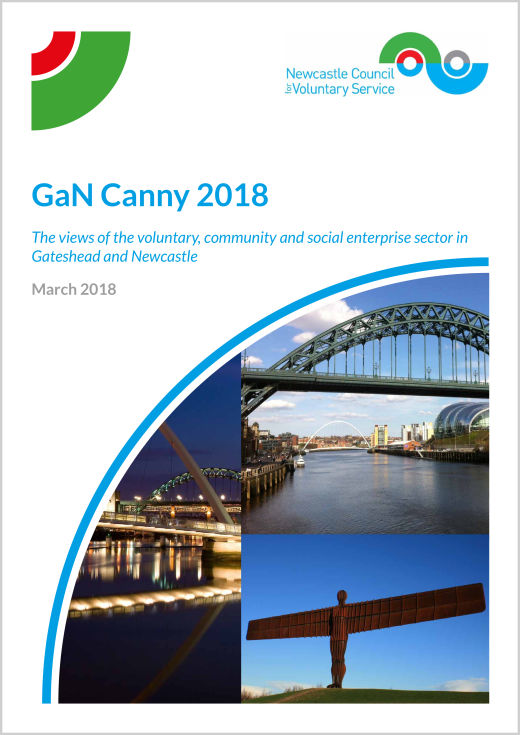Over 168 voluntary and community organisations from Gateshead and Newcastle responded to a survey by Newcastle CVS on austerity and the voluntary sector.
Author: Sally Young, Newcastle CVS
GaN is an abbreviation for Gateshead and Newcastle. ‘Canny’ reflects some of the current conversations around the Canny City – connectivity and community in particular. There are various local interpretations which include “any experience which is generally pleasant and enjoyable”, “take care”, “take it easy” and “be careful”.
For the last eight years I have been asking local voluntary and community organisations their views on how life is for them and for the people and communities they support. GaN Canny 2018 shares the findings after 168 organisations responded from Gateshead and Newcastle. It is both uplifting and bleak.
Uplifting in that despite a difficult year, some organisations are thriving - a third had more income than the previous year; two thirds of organisations had developed new services and initiatives in the last year, and many wanted to offer more in the next year.
Bleak because more organisations reported harder times for local communities – particularly with the impact of welfare reforms and the withdrawal of some public sector services. Some organisations were losing funding, staff and volunteers, whilst seeing demands for their services (up two thirds year on year growth).
Most local charities are set up when someone sees a need, something is going wrong, someone wants to offer something differently that isn’t part of the ‘State’. So a group of people come together voluntarily to see what they can do. They get a bit of money – it could be from fundraising from individuals, a charitable trust or the Council and they set something up. Sometimes the cause needs paid people to deliver it, sometimes equipment or a building, sometimes lots of volunteers (who need support, training and management) and it gets bigger. It might become a charity, recruit (volunteer) trustees, get more funding, expand its reach and employ people and then residents and communities rely on it and see it as an essential part of the social fabric.
The report highlights a number of challenges; not surprisingly funding and sustainability are the most pressing issues for local organisations, regardless of their size. At the same time, organisations have had to rely more on unpaid volunteers. Volunteer recruitment and retention is reported as the second largest challenge.
But more important are the issues faced by the people the organisations support. The people and communities using these services and facilities provided are experiencing increased poverty, mental illness and austerity, impacted by welfare reform, Universal Credit and personal debt. At the same time, many public sector services are harder to access due to changing criteria, different locations and charges.
The comments and concerns about general health and wellbeing are higher than in previous studies, such as:
“More people than ever before in our working memory are being refused public services (health and social care), have less money and fewer resources, and there is a visible impact on loneliness and isolation and a growth in general mental distress. At the same time we are getting fewer resources than before to deal with this.”
Some of the comments are bleak – particularly from the organisations supporting young people and asylum seekers and refugees, as they see life through the eyes of their beneficiaries.
"The ‘hostile environment’ policies mean that refused asylum seekers are increasingly pushed away from accessing mainstream services and underground making them increasingly vulnerable. Destitution is a huge issue which is complex and looks set to continue if not get worse. The third sector pick up pieces around this, but refugees are eligible for benefits so shouldn’t be facing destitution in the first place.”
But the value of these organisations can’t be underestimated:
“(We) helped them to turn their lives around, some returned to school/college/work. Increased health and wellbeing. Stabilised condition, preventing deterioration of health. Increased ability to manage their health condition / symptoms / circumstances that exacerbate or trigger their self-harming behaviours. Increased understanding and knowledge of Eating Disorders, symptoms, causes, underlying reasons. People being able to recognise and identify ED in others and support to find help to find and use early interventions / help.”
I’m sometimes accused of having a negative perspective; maybe it’s because I support organisations in crisis, but I’m always amazed and humbled by the amount of good that is done by people who just want to Gan Canny.
Read and download the free pdf in your browser, link below.

The publisher is Newcastle Council for Voluntary Service.
GaN Canny 2018 © Newcastle Council for Voluntary Service 2018.
All Rights Reserved. No part of this paper may be reproduced in any form without permission from the publisher except for the quotation of brief passages in reviews.
community, social justice, England, Paper